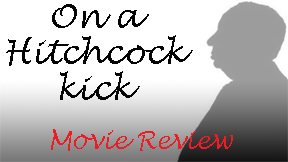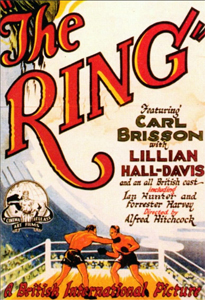Since the beginning of movies, there have been boxing films. The sport was so quickly recognized as cinematic that by 1927, when writer-director Alfred Hitchcock made “The Ring,” there had already been 19 boxing films, according to Wikipedia.
“The Ring’s” synopsis is that two men fight for the love of a woman, and that’s basically it. Early in my viewing of this silent film, I feared the story’s predictable nature would give it a foggy place in my brain, like a stunned boxer trying to recognize how many fingers the referee is flashing. Indeed, by Hitchcock’s later standards, the lack of a twist or surprise here is noticeable.
Quiet humor
Still, Hitchcock shows an early knack for silent visual comedy, particularly taking advantage of Gordon Harker, credited simply as “Jack’s Trainer.” He’s so bedraggled that even Burgess Meredith had his work cut out for him trying to equal that beaten-down look in the “Rocky” films a half-century later.

“The Ring” (1927)
Director: Alfred Hitchcock
Writers: Alfred Hitchcock, Alma Reville
Stars: Carl Brisson, Lillian Hall-Davis, Ian Hunter
At the wedding of Jack (Carl Brisson) and Mabel (Lillian Hall-Davis), the trainer is thrown into the job of best man. Hitch gets visual comedy out of the trainer picking his nose, a missing ring, and his misunderstanding of why people are pointing at his finger. At the reception, the trainer gets blitzed and Hitch shows visual flair by blurring the image – metaphorically blurring the distinction between Jack and his rival, Bob Corby (Ian Hunter).
Helped by the home-video addition of piano music (either by Xavier Berthelot in 2005 or Meg Morley in 2019; it’s unclear which version Prime is streaming), “The Ring” is watchable in a lazy-afternoon-on-the-couch way.
One minor complaint. Hitchcock features sped-up scenes of party dancers, and sped-up scenes of spectators clapping at the climactic match. It would’ve been nice to have the music match the performers’ movements. In these moments, the score is jarringly out of synch.
As for the narrative, we initially see the POV of Mabel as she is courted by both men. “One-Round” Jack (“the champion,” so to speak) knows her first, as she sells tickets for his circus act wherein he challenges people to go a round with him without being knocked silly. But Bob (“the challenger”) moves faster, giving her an armband – not coincidentally ring-shaped. Jack parries that by asking Mabel to marry him.
Of rings and triangles
I’m undecided whether it’s a perk or a bug that we don’t get a good sense of why Mabel ultimately chooses who she chooses. But isn’t that how it would be in real life? Sometimes we don’t know the “why” behind someone’s choice in a love triangle.
I expected one of the men to become villainous in the way of later rom-com cliches, so Hitchcock (co-writing with Alma Reville, his wife) deserves credit for dodging that. Instead, it’s like a modern TV dramedy with a love triangle wherein fans debate which guy the girl should choose. Only it’s not as drawn out, as the film is 89 minutes long.

“The Ring” sometimes feels like a short subject extended to feature length. I make note of early examples of what are now cliches, such as cuts to the worried-looking wife at ringside (although, granted, there’s a wrinkle, because she cares about both pugilists).
The style wins out. Although “The Ring” isn’t a comedy, I sense that Hitchcock finds boxing terrifically amusing. When Jack’s team frantically cools him by waving towels between rounds, it’s shot at a low frame-rate (as is the whole film) and sped up (visually signifying vaudeville comedy). And when watching on TV, it’s accompanied by that jaunty piano.
“The Ring” encourages us to smile, and it succeeds. But in the rich history of boxing films, well, it’s another boxing film. It effectively translates the sport’s natural drama into cinematic drama, but does not boast the emotional depth of later classics such as “Rocky.”
RFMC’s Alfred Hitchcock series reviews works by the Master of Suspense, plus remakes and source material. Click here to visit our Hitchcock Zone.

